Obama, Barack
president of United States
in full Barack Hussein Obama, Jr.
born Aug. 4, 1961, Honolulu, Hawaii, U.S.
 44th president of the United States (presidency of the United States of America) (2009– ) and the first African American to hold the office. Before winning the presidency, Obama represented Illinois in the U.S. Senate (Senate) (2005–08). He was the third African American to be elected to that body since the end of Reconstruction (1877). (On the eve of Obama's inauguration, journalist David Mendell, author of Britannica's biography of Obama and of the book Obama: From Promise to Power, answered a few questions about the new U.S. president on the Britannica Blog (http://www.britannica.com/blogs/2009/01/an-interview-with-david-mendell-obama-biographer-britannica-contributor/).)
44th president of the United States (presidency of the United States of America) (2009– ) and the first African American to hold the office. Before winning the presidency, Obama represented Illinois in the U.S. Senate (Senate) (2005–08). He was the third African American to be elected to that body since the end of Reconstruction (1877). (On the eve of Obama's inauguration, journalist David Mendell, author of Britannica's biography of Obama and of the book Obama: From Promise to Power, answered a few questions about the new U.S. president on the Britannica Blog (http://www.britannica.com/blogs/2009/01/an-interview-with-david-mendell-obama-biographer-britannica-contributor/).)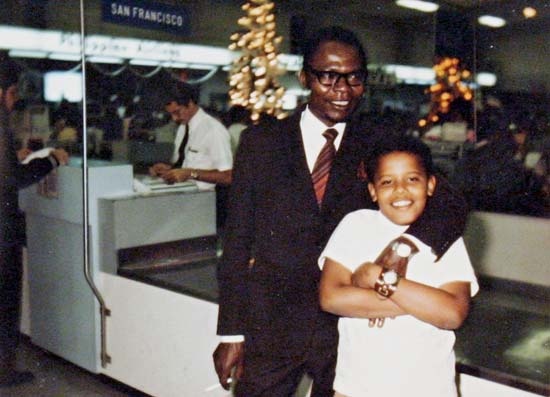 Obama's father, Barack Obama, Sr., was a teenage goatherd in rural Kenya; he won a scholarship to study in the United States and eventually became a senior economist in the Kenyan government. Obama's mother, S. Ann Dunham, grew up in Kansas, Texas, and Washington state before her family settled in Honolulu. In 1961 she and Barack Sr. met in a Russian language class at the University of Hawaii and married less than a year later.
Obama's father, Barack Obama, Sr., was a teenage goatherd in rural Kenya; he won a scholarship to study in the United States and eventually became a senior economist in the Kenyan government. Obama's mother, S. Ann Dunham, grew up in Kansas, Texas, and Washington state before her family settled in Honolulu. In 1961 she and Barack Sr. met in a Russian language class at the University of Hawaii and married less than a year later.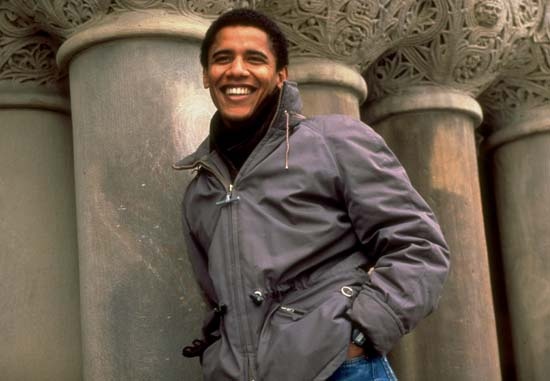 When Obama was age two, Barack Sr. left to study at Harvard University; shortly thereafter, in 1964, Ann and Barack Sr. divorced. (Obama saw his father only one more time, during a brief visit when Obama was 10.) Later Ann remarried, this time to another foreign student, Lolo Soetoro from Indonesia, with whom she had a second child, Maya. Obama lived for several years in Jakarta with his half sister, mother, and stepfather. While there, Obama attended both a government-run school where he received some instruction in Islam and a Catholic private school where he took part in Christian schooling.
When Obama was age two, Barack Sr. left to study at Harvard University; shortly thereafter, in 1964, Ann and Barack Sr. divorced. (Obama saw his father only one more time, during a brief visit when Obama was 10.) Later Ann remarried, this time to another foreign student, Lolo Soetoro from Indonesia, with whom she had a second child, Maya. Obama lived for several years in Jakarta with his half sister, mother, and stepfather. While there, Obama attended both a government-run school where he received some instruction in Islam and a Catholic private school where he took part in Christian schooling.He returned to Hawaii in 1971 and lived in a modest apartment, sometimes with his grandparents and sometimes with his mother (she remained for a time in Indonesia, returned to Hawaii, and then went abroad again—partly to pursue work on a Ph.D.—before divorcing Soetoro in 1980). For a brief period his mother was aided by government food stamps, but the family mostly lived a middle-class existence. In 1979 Obama graduated from Punahou School, an elite college preparatory academy in Honolulu.
Obama attended Occidental College in suburban Los Angeles for two years and then transferred to Columbia University in New York City, where in 1983 he received a bachelor's degree in political science. Influenced by professors who pushed him to take his studies more seriously, Obama experienced great intellectual growth during college and for a couple of years thereafter. He led a rather ascetic life and read works of literature and philosophy by William Shakespeare (Shakespeare, William), Friedrich Nietzsche (Nietzsche, Friedrich), Toni Morrison (Morrison, Toni), and others. After serving for a couple of years as a writer and editor for Business International Corp., a research, publishing, and consulting firm in Manhattan, he took a position in 1985 as a community organizer on Chicago's largely impoverished Far South Side. He returned to school three years later and graduated magna cum laude in 1991 from Harvard University's law school, where he was the first African American to serve as president of the Harvard Law Review. While a summer associate in 1989 at the Chicago law firm of Sidley Austin, Obama had met Chicago native Michelle Robinson (Obama, Michelle), a young lawyer at the firm. The two married in 1992.
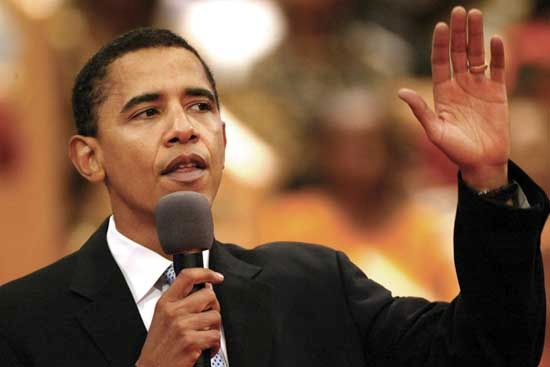 After receiving his law degree, Obama moved to Chicago and became active in the Democratic Party. He organized Project Vote, a drive that registered tens of thousands of African Americans on voting rolls and that is credited with helping Democrat Bill Clinton (Clinton, Bill) win Illinois and capture the presidency in 1992. The effort also helped make Carol Moseley Braun (Moseley Braun, Carol), an Illinois state legislator, the first African American woman elected to the U.S. Senate. During this period, Obama wrote his first book and saw it published. The memoir, Dreams From My Father (1995), is the story of Obama's search for his biracial identity by tracing the lives of his now-deceased father and his extended family in Kenya. Obama lectured on constitutional law at the University of Chicago (Chicago, University of) and worked as an attorney on civil rights issues. In 1996 he was elected to the Illinois Senate, where, most notably, he helped pass legislation that tightened campaign finance regulations, expanded health care to poor families, and reformed criminal justice and welfare laws.
After receiving his law degree, Obama moved to Chicago and became active in the Democratic Party. He organized Project Vote, a drive that registered tens of thousands of African Americans on voting rolls and that is credited with helping Democrat Bill Clinton (Clinton, Bill) win Illinois and capture the presidency in 1992. The effort also helped make Carol Moseley Braun (Moseley Braun, Carol), an Illinois state legislator, the first African American woman elected to the U.S. Senate. During this period, Obama wrote his first book and saw it published. The memoir, Dreams From My Father (1995), is the story of Obama's search for his biracial identity by tracing the lives of his now-deceased father and his extended family in Kenya. Obama lectured on constitutional law at the University of Chicago (Chicago, University of) and worked as an attorney on civil rights issues. In 1996 he was elected to the Illinois Senate, where, most notably, he helped pass legislation that tightened campaign finance regulations, expanded health care to poor families, and reformed criminal justice and welfare laws.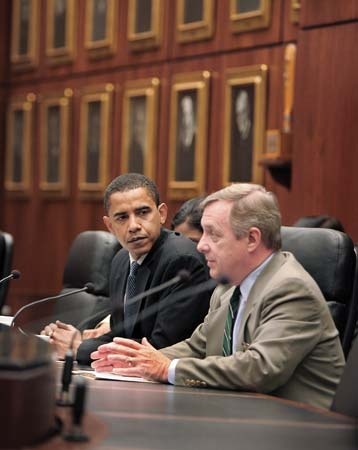 In 2004 he was elected to the U.S. Senate, defeating Republican Alan Keyes (Keyes, Alan) in the first U.S. Senate race in which the two leading candidates were African Americans. While campaigning for the U.S. Senate, Obama gained national recognition by delivering the keynote address at the Democratic National Convention in July 2004. The speech wove a personal narrative of Obama's biography with the theme that all Americans are connected in ways that transcend political, cultural, and geographical differences. The address lifted Obama's once obscure memoir onto best-seller lists, and, after taking office the following year, Obama quickly became a major figure in his party. A trip to visit his father's home in Kenya in August 2006 gained international media attention, and Obama's star continued ascending. His second book, The Audacity of Hope (2006), a mainstream polemic on his vision for the United States, was published weeks later, instantly becoming a major best seller. In February 2007 he announced at the Old State Capitol in Springfield, Ill., where Abraham Lincoln (Lincoln, Abraham) had served as a state legislator, that he would seek the Democratic Party's presidential nomination in 2008. (For coverage of the 2008 election, see United States Presidential Election of 2008.)
In 2004 he was elected to the U.S. Senate, defeating Republican Alan Keyes (Keyes, Alan) in the first U.S. Senate race in which the two leading candidates were African Americans. While campaigning for the U.S. Senate, Obama gained national recognition by delivering the keynote address at the Democratic National Convention in July 2004. The speech wove a personal narrative of Obama's biography with the theme that all Americans are connected in ways that transcend political, cultural, and geographical differences. The address lifted Obama's once obscure memoir onto best-seller lists, and, after taking office the following year, Obama quickly became a major figure in his party. A trip to visit his father's home in Kenya in August 2006 gained international media attention, and Obama's star continued ascending. His second book, The Audacity of Hope (2006), a mainstream polemic on his vision for the United States, was published weeks later, instantly becoming a major best seller. In February 2007 he announced at the Old State Capitol in Springfield, Ill., where Abraham Lincoln (Lincoln, Abraham) had served as a state legislator, that he would seek the Democratic Party's presidential nomination in 2008. (For coverage of the 2008 election, see United States Presidential Election of 2008.)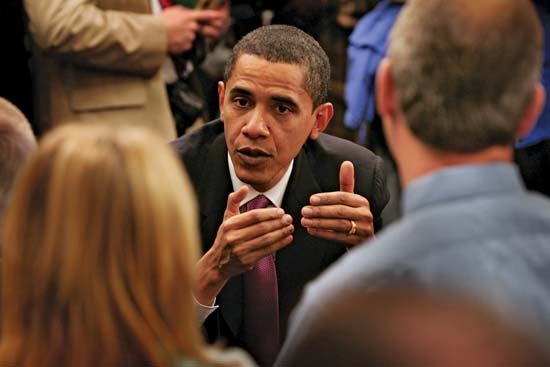
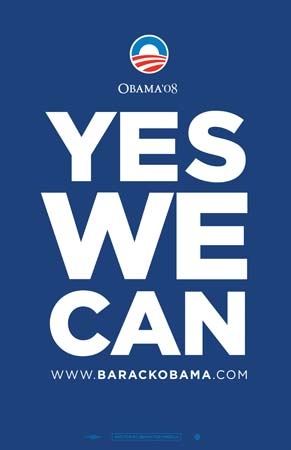 Obama's personal charisma, stirring oratory, and his campaign promise to bring change to the established political system resonated with many Democrats, especially young and minority voters. On Jan. 3, 2008, Obama won a surprise victory in the first major nominating contest, the Iowa caucus, over Sen. Hillary Clinton (Clinton, Hillary Rodham), who was the overwhelming favourite to win the nomination. Five days later, however, Obama finished second to Clinton in the New Hampshire primary, and a bruising—and sometimes bitter—primary race ensued. Obama won more than a dozen states—including Illinois, his home state, and Missouri, a traditional political bellwether—on Super Tuesday, February 5. No clear front-runner for the nomination emerged, however, as Clinton won many states with large populations, such as California and New York. Obama produced an impressive string of victories later in the month, handily winning the 11 primaries and caucuses that immediately followed Super Tuesday, which gave him a significant lead in pledged delegates. His momentum slowed in early March when Clinton won significant victories in Ohio and Texas. Though still maintaining his edge in delegates, Obama lost the key Pennsylvania primary on April 22. Two weeks later he lost a close contest in Indiana but won the North Carolina primary by a large margin, widening his delegate lead over Clinton. She initially had a big lead in so-called superdelegates (Democratic Party officials allocated votes at the convention that were unaffiliated with state primary results), but, with Obama winning more states and actual delegates, many peeled away from her and went to Obama. On June 3, following the final primaries in Montana and South Dakota, the number of delegates pledged to Obama surpassed the total necessary to claim the Democratic nomination.
Obama's personal charisma, stirring oratory, and his campaign promise to bring change to the established political system resonated with many Democrats, especially young and minority voters. On Jan. 3, 2008, Obama won a surprise victory in the first major nominating contest, the Iowa caucus, over Sen. Hillary Clinton (Clinton, Hillary Rodham), who was the overwhelming favourite to win the nomination. Five days later, however, Obama finished second to Clinton in the New Hampshire primary, and a bruising—and sometimes bitter—primary race ensued. Obama won more than a dozen states—including Illinois, his home state, and Missouri, a traditional political bellwether—on Super Tuesday, February 5. No clear front-runner for the nomination emerged, however, as Clinton won many states with large populations, such as California and New York. Obama produced an impressive string of victories later in the month, handily winning the 11 primaries and caucuses that immediately followed Super Tuesday, which gave him a significant lead in pledged delegates. His momentum slowed in early March when Clinton won significant victories in Ohio and Texas. Though still maintaining his edge in delegates, Obama lost the key Pennsylvania primary on April 22. Two weeks later he lost a close contest in Indiana but won the North Carolina primary by a large margin, widening his delegate lead over Clinton. She initially had a big lead in so-called superdelegates (Democratic Party officials allocated votes at the convention that were unaffiliated with state primary results), but, with Obama winning more states and actual delegates, many peeled away from her and went to Obama. On June 3, following the final primaries in Montana and South Dakota, the number of delegates pledged to Obama surpassed the total necessary to claim the Democratic nomination.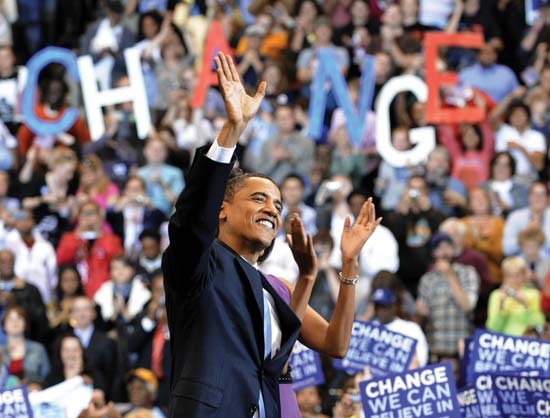
 On August 27 Obama became the first African American to be nominated for the presidency by either major party and went on to challenge Republican Sen. John McCain (McCain, John) for the country's highest office. McCain criticized Obama, still a first-term senator, as being too inexperienced for the job. To counter, Obama selected Joe Biden (Biden, Joe), a veteran senator from Delaware who had a long resume of foreign policy expertise, to be his vice-presidential running mate. Obama and McCain waged a fierce and expensive contest. Obama, still bolstered by a fever of popular support, eschewed federal financing of his campaign and raised hundreds of millions of dollars, much of it coming in small donations and over the Internet from a record number of donors. Obama's fund-raising advantage helped him buy massive amounts of television advertising and organize deep grassroots organizations in key battleground states and in states that had voted Republican in previous presidential cycles. The two candidates offered a stark ideological choice for voters. Obama called for a swift withdrawal of most combat forces from Iraq and a restructuring of tax policy that would bring more relief to lower- and middle-class voters, while McCain said the United States must wait for full victory in Iraq and charged that Obama's rhetoric was long on eloquence but short on substance.
On August 27 Obama became the first African American to be nominated for the presidency by either major party and went on to challenge Republican Sen. John McCain (McCain, John) for the country's highest office. McCain criticized Obama, still a first-term senator, as being too inexperienced for the job. To counter, Obama selected Joe Biden (Biden, Joe), a veteran senator from Delaware who had a long resume of foreign policy expertise, to be his vice-presidential running mate. Obama and McCain waged a fierce and expensive contest. Obama, still bolstered by a fever of popular support, eschewed federal financing of his campaign and raised hundreds of millions of dollars, much of it coming in small donations and over the Internet from a record number of donors. Obama's fund-raising advantage helped him buy massive amounts of television advertising and organize deep grassroots organizations in key battleground states and in states that had voted Republican in previous presidential cycles. The two candidates offered a stark ideological choice for voters. Obama called for a swift withdrawal of most combat forces from Iraq and a restructuring of tax policy that would bring more relief to lower- and middle-class voters, while McCain said the United States must wait for full victory in Iraq and charged that Obama's rhetoric was long on eloquence but short on substance. Ed.
Additional Reading
David Mendell, Obama: From Promise to Power (2007), is a comprehensive biography based on interviews with Obama and with his wife, family, friends, aides, and rivals as well as on the author's experience as a journalist covering Obama's rise. Although written by an ardent supporter and former law student of Obama's, John K. Wilson, Barack Obama: This Improbable Quest (2007), provides a useful examination of Obama's policy positions in Illinois. Pete Souza, The Rise of Barack Obama (2008), presents a collection of photographs. Liza Mundy, Michelle: A Biography (2008), offers a fairly objective portrait of Michelle Obama, though the author was able to conduct only one brief interview with her subject. Barack Obama and Lisa Rogak (ed.), Barack Obama in His Own Words (2007), is primarily a collection of speeches by Obama. Barack Obama, Change We Can Believe In: Barack Obama's Plan to Renew America's Promise (2008), is basically a long policy paper, but it does give the reader some idea of Obama's campaign promises.
- Nipigon, Lake
- Nipissing, Lake
- Nipkow, Paul Gottlieb
- Nipmuc
- nippapañca
- Nippon Hōsō Kyōkai
- Nippon Steel Corporation
- Nippon Telegraph and Telephone Corporation
- Nippur
- Nipsey Russell
- Nirankari
- Nirenberg, Marshall Warren
- Nirgal Vallis
- nirguṇa
- nirjara
- Nirmala
- Nirvana
- nirvana
- Nisa
- nise-e
- Nisei
- Nishapur pottery
- Nishi Amane
- Nishida Kitarō
- Nishikawa Sukenobu
 Cabinet of President Barack Obama In the event, Obama won the election, capturing nearly 53 percent of the popular vote and 365 electoral votes. Not only did he hold all of those states that John Kerry (Kerry, John) had won in the 2004 election, but he also captured a number of states (e.g., Colorado, Florida, Nevada, Ohio, and Virginia) that the Republicans had carried in the last two presidential elections. Shortly after his victory, Obama resigned from the Senate. On Jan. 20, 2009, he was sworn in as president. (The table provides a list of cabinet members in the administration of Pres. Barack Obama. Cabinet of President Barack Obama)
Cabinet of President Barack Obama In the event, Obama won the election, capturing nearly 53 percent of the popular vote and 365 electoral votes. Not only did he hold all of those states that John Kerry (Kerry, John) had won in the 2004 election, but he also captured a number of states (e.g., Colorado, Florida, Nevada, Ohio, and Virginia) that the Republicans had carried in the last two presidential elections. Shortly after his victory, Obama resigned from the Senate. On Jan. 20, 2009, he was sworn in as president. (The table provides a list of cabinet members in the administration of Pres. Barack Obama. Cabinet of President Barack Obama)